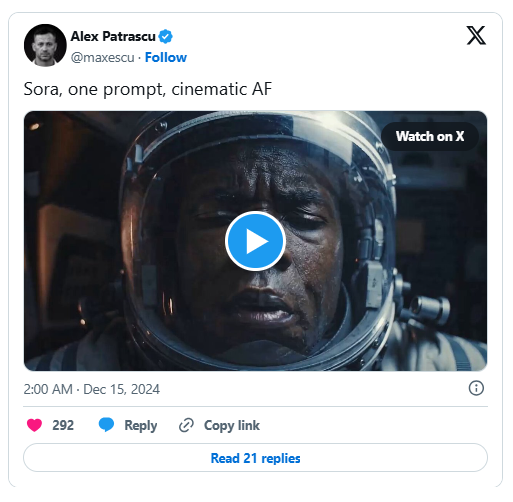OpenAI has announced that it currently has no plans to release an API for its breakthrough AI video generation model Sora. Although Sora is able to generate stunningly realistic videos, OpenAI said that after the previous release of Sora, it had to close the registration channel due to huge traffic that exceeded expectations, and it is currently focusing on increasing production capacity. This decision contrasts with the strategies of other competitors such as Google (Veo and Veo2) and Amazon Web Services (AWS), which have already provided APIs for their respective video generation models.
In an AMA event held by the OpenAI developer team, the OpenAI developer experience director made it clear that there are no plans to launch the Sora API. OpenAI CEO Sam Altman also admitted that he underestimated the demand for Sora and promised that he is working hard to solve the capacity problem and let more users access Sora as soon as possible. While OpenAI reinstated Sora's registration a few days ago, the lack of an API may put it at a competitive disadvantage, opening up opportunities for other competitors. The image shows stunning video footage generated by the Sora model.

Altman wrote: "We severely underestimated the need for Sora. It will take a while to make it accessible to everyone. We are working hard to figure out how to do this as quickly as possible!"
OpenAI restored Sora's registration a few days ago.
Choosing not to prioritize development of Sora's API could put OpenAI at a disadvantage against archrival Google. Google launched a limited-access API for its video generation model Veo in early December. Google said this week that Veo's successor, Veo2, which became popular for its impressive high-quality output, will get an API sometime in 2025.
Amazon Web Services (AWS) also provides an API for its recently launched Nova Reel video model. Additionally, many startups focusing on generative video also provide APIs for their models. One of the companies, Runway, claims that its API is used by "the world's largest consumer technology companies to reliably generate millions of videos for their users."
OpenAI's suspension of the release of Sora API will undoubtedly bring opportunities to other competitors, and also highlights the challenges of AI video generation technology in terms of production capacity. How to meet the growing market demand while ensuring quality will become a problem that all AI companies need to face together.
OpenAI’s decision to postpone the launch of Sora API reflects the challenge of balancing production capacity and market demand in AI model development. The future launch of Sora API will directly affect OpenAI's competitive landscape in the field of AI video generation.